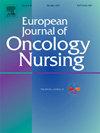育龄癌症妇女及其配偶二元应对与生活质量的关系:生育顾虑和自我表露的中介作用——基于行动者-伴侣相互依赖中介模型
IF 2.7
3区 医学
Q1 NURSING
引用次数: 0
摘要
目的探讨二元应对策略对育龄癌症妇女及其配偶生活质量的影响,以生育顾虑和自我表露为中介。方法于2023年3月至10月在全国5家三级医院共招募302对夫妇(患者及配偶)。采用自行设计的信息量表和标准化量表(二元应对量表、compi -生育问题压力量表-短表、痛苦披露指数、世界卫生组织生活质量量表- bref)收集数据,并采用行动者-伴侣相互依存中介模型(APIMeM)进行分析。结果患者平均生活质量评分为54.58±6.81,配偶平均生活质量评分为56.23±7.24。双方的DC策略与各自的QoL呈正相关。配偶的DC通过患者的生育顾虑间接影响患者的生活质量(β = 0.028, P = 0.020),配偶的生育顾虑间接影响患者的生活质量(β = 0.052, P = 0.002)。患者DC通过自我表露介导自身生活质量(β = 0.028, P = 0.018)。结论本研究强调了癌症患者夫妻之间DC的双向关系动态。配偶的应对行为通过生育相关的痛苦间接影响伴侣的幸福感,而患者的应对行为主要通过沟通过程影响自身的生活质量。这些发现强调DC是一个关系过程,需要以夫妻为中心的干预来解决相互依赖的应对需求,而不是孤立的个人方法。本文章由计算机程序翻译,如有差异,请以英文原文为准。
Relationship between dyadic coping and quality of life among women of childbearing age with cancer and their spouses: mediating roles of fertility concerns and self-disclosure based on the actor-partner interdependence mediation model
Purpose
To explore the influence of dyadic coping (DC) strategies on the quality of life (QoL) of women of childbearing age with cancer and their spouses, considering fertility concerns and self-disclosure as mediators.
Methods
A total of 302 couples (patients and spouses) were recruited from five tertiary hospitals in China between March and October 2023. Data were collected using the self-designed information scale and standardized scales (Dyadic Coping Inventory, COMPI-Fertility Problem Stress Scales-Short Form, Distress Disclosure Index, World Health Organization Quality of Life Scale-BREF) and analyzed via Actor-Partner Interdependence Mediation Model (APIMeM).
Results
Patients reported a mean QoL score of 54.58 ± 6.81, while spouses scored 56.23 ± 7.24. Both partners' DC strategies positively correlated with their own QoL. Spouses' DC indirectly influenced patients' QoL through patients' fertility concerns (β = 0.028, P = 0.020) and their own QoL via spouses' fertility concerns (β = 0.052, P = 0.002). Patients’ DC mediated their own QoL through self-disclosure (β = 0.028, P = 0.018).
Conclusions
This study highlights the bidirectional relational dynamics of DC in cancer-affected couples. While DC strategies directly enhance individual QoL, spouses' coping behaviors indirectly shape partners' well-being through fertility-related distress, whereas patients’ DC primarily influences their own QoL via communication processes. These findings emphasize DC as a relational process requiring couple-centered interventions to address interdependent coping needs, rather than isolated individual approaches.
求助全文
通过发布文献求助,成功后即可免费获取论文全文。
去求助
来源期刊
CiteScore
4.40
自引率
3.60%
发文量
109
审稿时长
57 days
期刊介绍:
The European Journal of Oncology Nursing is an international journal which publishes research of direct relevance to patient care, nurse education, management and policy development. EJON is proud to be the official journal of the European Oncology Nursing Society.
The journal publishes the following types of papers:
• Original research articles
• Review articles

 求助内容:
求助内容: 应助结果提醒方式:
应助结果提醒方式:


